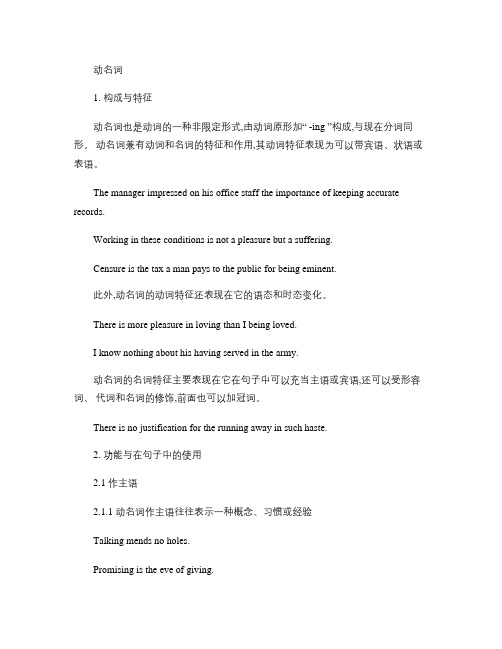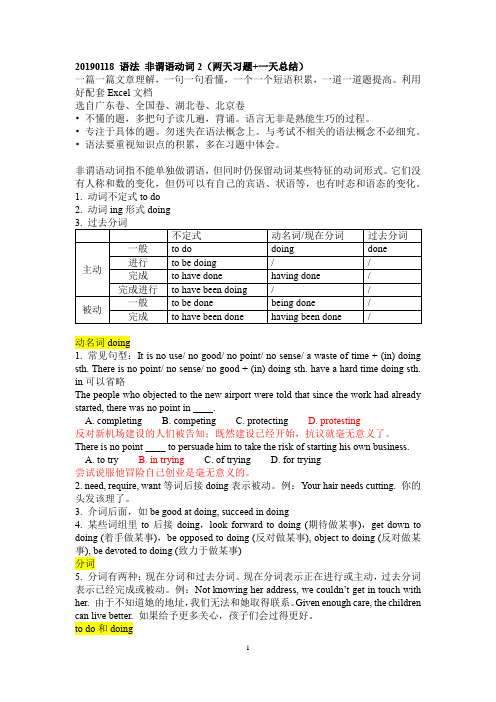非谓语动词2
- 格式:doc
- 大小:40.00 KB
- 文档页数:5

动名词1. 构成与特征动名词也是动词的一种非限定形式,由动词原形加“ -ing ”构成,与现在分词同形。
动名词兼有动词和名词的特征和作用,其动词特征表现为可以带宾语、状语或表语。
The manager impressed on his office staff the importance of keeping accurate records.Working in these conditions is not a pleasure but a suffering.Censure is the tax a man pays to the public for being eminent.此外,动名词的动词特征还表现在它的语态和时态变化。
There is more pleasure in loving than I being loved.I know nothing about his having served in the army.动名词的名词特征主要表现在它在句子中可以充当主语或宾语,还可以受形容词、代词和名词的修饰,前面也可以加冠词。
There is no justification for the running away in such haste.2. 功能与在句子中的使用2.1 作主语2.1.1 动名词作主语往往表示一种概念、习惯或经验Talking mends no holes.Promising is the eve of giving.Talking to him is talking to a wall.2.1.2 有时用 it 作形式主语,将动名词结构后置It ’ s no use complaining.It ’ s nice seein g you again.It is fun playing with children.It ’ s a wonder meeting you here.It ’ s no good striving against the stream.2.1.3 用作 there be句型中表示“没法……”There was no telling when this might happen again.There is no hiding of evil but not to do it.2.2 动名词作表语*Seeing is believing.Life is painting a picture, not doing a sum.*比较:To see is to believe.2.3动名词作宾语2.3.1 习惯接动名词作宾语的动词表示“避免、回避、逃避、免得”的动词:avoid, escape, evade, miss, save, shirk, shun 等Jack escaped being punished.Don't evade doing you duty.We all missed see the new film.It will save going to town.The man shunned speaking in public.表示“建议、提议、提倡”等的动词:advise, advocate, recommend, suggest, 等 The committee recommended raising the age to twenty-one.Who suggested doing it this way?表示“禁止、阻止”的动词:bar, discourage, forbid, prevent, prohibit,等We discourage smoking in our school.The regulations forbid walking on grass.That didn't prevent our getting on very well together.表示“停止、中止、放弃”的动词:discontinue, give up, leave off, quit, stop等表示“推迟”的动词 : defer, delay, hold off, put off, postpone等I am sorry to have delayed answering your letter.You shouldn't put off seeing a doctor.表示” 承认、否认” 的动词:admit, acknowledge, confess, deny等She admitted having read the letter.Green denied doing anything illegal.He confessed taking part in a plot to free the prisoner.They acknowledged having been defeated.表示“回忆、回想、报道、提及“的动词:recall, recollect, mention, report等 He recollected meeting the king.Mary mentioned hearing from her parents.They reported having seen a puma.表示“喜爱、爱好、乐于、不愿、不喜欢、痛恨“的动词:appreciate, detest, dislike, enjoy, grudge, relish, resent,等We ’ ll appreciate hearing from you soon.I grudge paying $20 for a bottle of wine.Hilary won’ t relish having to wash all these dishes.其它动词:anticipate, consider, contempla te, doubt, excuse, finish, fancy, can’ t help, can ’ t resist, imagine, involve, keep, mind, practice, resume, risk等等2.3.2 既可接不定式又可接动名词的动词2.3.2.1 二者的意义有本质区别,这样的动词有 forget, remember, regret, mean, stop, try 等Don't forget to bring your notebook next time.I will never forget doing the work.Please remember to post my letter.I remember seeing him somewhere.I regret to tell you that he has failed.I regret making such a foolish mistake.I don't mean to say that he is very poor.Missing the train means waiting an hour.2.3.2.2 二者意思无本质区别 :这类动词有 adore, like, love, grudge, hate, loathe, dread, deserve, begin, commence, start, cease, continue, bear, endure, intend, prefer, neglect, omit, scorn, need, require, want, 等其中表示喜恶的几个动词,如 like, love, hate 等,接动名词时常表示习惯性、经常性的行为或动作,接不定式时常表示具体的、一时性的行为。




20190118 语法非谓语动词2(两天习题+一天总结)一篇一篇文章理解,一句一句看懂,一个一个短语积累,一道一道题提高。
利用好配套Excel文档选自广东卷、全国卷、湖北卷、北京卷•不懂的题,多把句子读几遍,背诵。
语言无非是熟能生巧的过程。
•专注于具体的题。
勿迷失在语法概念上。
与考试不相关的语法概念不必细究。
•语法要重视知识点的积累,多在习题中体会。
非谓语动词指不能单独做谓语,但同时仍保留动词某些特征的动词形式。
它们没有人称和数的变化,但仍可以有自己的宾语、状语等,也有时态和语态的变化。
1. 动词不定式to do2. 动词ing形式doing动名词doing1. 常见句型:It is no use/ no good/ no point/ no sense/ a waste of time + (in) doing sth. There is no point/ no sense/ no good + (in) doing sth. have a hard time doing sth. in可以省略The people who objected to the new airport were told that since the work had already started, there was no point in ____.A. completingB. competingC. protectingD. protesting反对新机场建设的人们被告知;既然建设已经开始,抗议就毫无意义了。
There is no point ____ to persuade him to take the risk of starting his own business. A. to try B. in trying C. of trying D. for trying尝试说服他冒险自己创业是毫无意义的。

3.不定式和动名词作宾语的区别英语中大多数动词既可跟不定式,也可跟动名词作直接宾语,但有些动词要求:(1)不定式做宾语和宾语补足语1)下面的动词要求不定式做宾语attempt企图 enable能够 neglect忽视afford负担得起 demand要求 long渴望arrange安排 destine注定 mean意欲,打算begin开始 expect期望 omit忽略,漏appear似乎,显得 determine决定 manage设法cease停止 hate憎恨,厌恶 pretend假装ask问 dread害怕 need需要agree同意 desire愿望 love爱swear宣誓 volunteer志愿 wish希望bear承受 endeavor努力 offer提供beg请求 fail不能 plan计划bother扰乱;烦恼 forget忘记 prefer喜欢,宁愿care关心,喜欢 happen碰巧 prepare准备decide决定 learn学习 regret抱歉,遗憾choose选择 hesitate犹豫 profess表明claim要求 hope希望 promise承诺,允许start开始 undertake承接 want想要consent同意,赞同 intend想要 refuse拒绝decide决定 learn学习 vow起contrive设法,图谋 incline有…倾向 propose提议seek找,寻觅 try试图2)下面的动词要求不定式做宾补:动词+宾语+动词不定式ask要求,邀请 get请,得到 prompt促使allow允许 forbid禁止 prefer喜欢,宁愿announce宣布 force强迫 press迫使bride 收买 inspire鼓舞 request请求assist协助 hate憎恶 pronounce断定,表示advise劝告 exhort告诫,勉励 pray请求authorize授权,委托 help帮助 recommend劝告,推荐bear容忍 implore恳求 remind提醒beg请求 induce引诱 report报告compel强迫 invite吸引,邀请, summon传唤command命令 intend想要,企图 show 显示drive驱赶 mean意欲,打算 train训练cause引起 instruct指示 require要求deserve应受 leave使,让 tell告诉direct指导 like喜欢 tempt劝诱entitle有资格 order命令 warn告诫enable使能够 need需要 urge激励,力说encourage鼓励 oblige不得不 want想要condemn指责,谴责 lead引起,使得 teach教entreat恳求 permit允许 wish希望(2)有少数动词只能用动名词作宾语acknowledge承认,自认 cease 停止 mention说到,讲到admit 承认 tolerate忍受 dislike不喜欢,讨厌advocate:提倡,主张 complete完成 dread可怕appreciate 感激,欣赏 confess坦白 endure忍受avoid避免 contemplate细想 enjoy享有,喜爱bear忍受 defer拖延 envy嫉妒can’t help不禁 delay延迟 escape逃跑,逃避can’t stand受不了 deny否认 excuse借口consider 考虑 detest嫌恶 fancy幻想,爱好favor 造成,偏爱 mind 介意 repent悔悟figure描绘,计算 miss错过 resent怨恨finish完成,结束不得 pardon原谅,饶恕 resist抵抗,阻止forgive原谅 permit 允许 resume恢复imagine设想 postpone延迟,延期 risk冒险involve卷入,包含 practise 实行,实践 suggest建议hate讨厌 prevent阻止 save营救,储蓄keep保持 quit放弃停止 stand坚持,忍受loathe非常讨厌,厌恶 recall回想例如:I appreciate having been given the opportunity to study abroad two years ago.我很感激两年前给我出国学习的机会。
非谓语动词(2)1. She didn’t remember _____him before.A. having metB. have metC. to meetD. to having met2. _____ the radio—the baby’s asleep in the next room.A. TurningB. To turnC. TurnedD. Turn3. _____ is believing.A. To seeB. SeeingC. SeeD. To be seen4. I’m hungry. Get me something _____.A. eatB. to eatC. eatingD. for eating5. _____, I went to the railway station to see my friend off.A. After eating quickly my dinnerB. After my quickly eating dinnerC. After eating my dinner quicklyD. After eating my quickly dinner6. I can’t imagine _____ that with them.A. doB. to doC. being doneD. doing7. We’re looking forward _____ the photo exhibition.A. to visitingB. to visitC. to having visitedD. visiting8. When I handed the report to John, he said that George was the person _____.A. to sendB. for sending itC. to send it toD. for sending it to9. I heard the terrible sound of _____ last night.A. the door’s shuttingB. the door being shuttingC. the door’s being shutD. the door being shut10. It was so cold that they kept the fire _____ all right.A. to burnB. burnC. burningD. burned11. The poor boy couldn’t _____ eating the things left on the table.A. insistB. resistC. pretendD. think12. Does _____ mean nothing to him?A. our saying thatB. for us to say thatC. we way thatD. of us to say that13. I regret _____ that wonderful exhibition last week.A. not to seeB. having not seenC. to not seeD. not having seen14. _____ will soon be completed.A. The building of the houseB. The building houseC. A building houseD. Building a house15. He received a letter the day before yesterday _____ him to go back to his home as soon as possible.A. askingB. to askC. askedD. having asked16. _____ from his appearance, he is very strong.A. JudgingB. Being judgedC. To judgeD. Judge17. _____ that he ill, his work should be done by others.A. ConsideredB. To considerC. ConsideringD. Consider18. I looked forward _____ what was happening in the crowd.A. to seeingB. sawC. to seeD. meeting19. The sports meetingseems like a ______.A. long time to waitB. long time for waitingC. time of long waitD. long waiting time20. He was disappointed to find his suggestion _____.A. been turned downB. turned sownC. to be turned downD. to turn down21. ----Mum, I think I’m _____ to get back to school.---- Not really, my dear. You’d better stay at home for another day or two.A. so wellB. so goodC. well enoughD. good enough22. Returning home _____.A. my watch was missingB. my watch was goneC. my watch was lostD. I found my watch missing23. _____ at a decision, they immediately set to work.A. ArrivingB. ArrivedC. Having arrivedD. Having been arrived24. Did you smell something _____.A. burnB. burningC. to be burntD. being burnt25. What made him _____?A. frightenB. frightenedC. frighteningD. to frighten26. The building _____ will be a hospital.A. buildB. to be builtC. being builtD. being building27. While _____ to foreigners, you must try your best to make yourself _____.A. spoken; understoodB. spoken; understandC. speaking; understoodD. speaking; understand28. He had his leg _____ in the match yesterday.A. to breakB. breakC. brokenD. breaking29. _____ from space, our earth, with water covering 70% of its surface, appears as a “blue planet”.A. SeenB. SeeingC. Having seenD. To see30. The story _____by the famous writer is _____ at the factory now.A. wrote, printedB. written, being printedC. write, being printedD. written, printed31. _____ their work, they had a rest.A. Having finishedB. FinishedC. Having been finishedD. Finishing32. _____ to a high temperature, water will change into vapour.A. Heated B Heating C. Being heated D. Having heated33. Once _____, it can never _____.A. see; forgottenB. see; forgetC. seen; be forgottenD. seeing; be forgotten34. _____ for months, the room is very dirty.A. We don’t clean itB. Having not cleanedC. Not having been cleanedD. Having not been cleaned35. The boy lay on bed, with his eyes _____.A. half closeB. half closedC. half closingD. to half close36. The _____ girl sat in the corner, ______.A. frighten; cryingB. frightened; cryingC. frightened; criedD. frightening; crying37. The lecture was so _____ that we were all _____.A. inspiring, excitingB. inspired, excitingC. inspiring, excitedD. inspired, excited38. The boy fell down to the ground, his eyes _____ and his hands _____.A. close, trembleB. closed, trembledC. closing, treblingD. closed, trembling39. With the work _____, Mr. Lin went out for a swim.A. havingB. doneC. doingD. being done40. _____ from his accent, he must be from Shanghai.A. JudgeB. JudgingC. JudgedD. Being judged41. What’s the language ______ in Germany?A. speakingB. spokenC. be spokenD. to speak42. I’m going to have my radio ______.A. to fixB. fixedC. fixD. fixing43. _____ in a poor peasant family, the boy was unable to go to school.A. Being bornB. BornC. Having been bornD. Being proved44. He had never spent a _____ day.A. more worryB. most worryingC. more worryingD. most worried45. _____ louder and make yourself _____.A. Speaking; hearingB. Speaking; heardC. To speak; hearD. Speak; heard46. Don’t you like to have your room _____ clean and tidy?A. to lookB. lookedC. lookingD. look47. We should consider it _____ a duty to serve the Chinese people heart and soulA. to beB. beC. asD. Either A or C48. ---- Have you finished the maths problem?----Not yet, because I find it difficult ______.A. in working outB. working outC. to work it outD. to work out49. ---- Why not go swimming as it is such a fine day?---- I want to, but I’m _____busy to go.A. enoughB. tooC. veryD. so50. Though I can’t make the model ship ____ faster, the model plane can be made ____ higher by any of the boys here.A. sail; to flyB. to sail; flyC. to sail; to flyD. sail; fly答案:ADBBC DACDC BADAA ACCBB CDCBB CCCAB AACCB BCDBB BBBCD DDDBA。
外研版英语中考英语非谓语动词一、动词被动语态1.You throw it away. It can .A. needn't; recycleB. needn't; be recycledC. don't need; be recycled【答案】 B【解析】【分析】句意:你没有必要把它扔掉。
它可以被回收利用。
need的否定形式是needn't,不必,后跟动词原形;recycle,回收利用,和主语it之间是被动关系,因此用被动语态,can 是情态动词,含有情态动词的被动语态:情态动词+be+done,故选B。
【点评】此题考查情态动词need和含有情态动词的被动结构。
2.Around the world, 300 million tons of plastic _________each year, of which about 10 percent ends up in the sea.A. is createdB. was createdC. creates【答案】 A【解析】【分析】句意:在全世界,每年30亿吨的塑料被创造,其中大约10%在大海里告终。
each year和一般现在时连用,因此排除B;plastic和create之间是被动关系,be done,主语是 300 million tons of plastic,谓语动词要用单数,因此是is created,故选A。
【点评】考查动词的时态和语态,注意在语境中熟练运用动词的时态和语态。
3.It's not your turn yet.Please wait on the chair over there until you _______.A. are callingB. have calledC. are called【答案】 C【解析】【分析】句意:现在还没有轮到你.请等在那边的椅子上,直到有人叫你。
非谓语动词定义:在句中充当除谓语以外的句子成分的动词形式叫做非谓语动词三种形式:动词ing形式,过去分词(done)和动词不定式(to do),一.现在分词doing现在分词的一般式构成为V-ing,在语态上表示主动意义,动作往往是正在进行或者与谓语动词同时发生。
现在分词主动语态被动语态与谓语动词的关系一般式Doing Being d one 与谓语动作同时发生完成式Having d one Having been d one 动作发生在谓语动作之前1. 现在分词作表语(1) 分词作表语有两种情况,一种是现在分词作表语,一种是过去分词作表语,究竟是用现在分词还是用过去分词作表语是学生们经常困惑的地方。
一般来说,表示心理状态的动词如excite,interest等都是及物动词,汉语意思不是“激动”,“高兴”,而是“使激动”、“使高兴”,因而现在分词应该是“令人激动的”、“令人高兴的”,过去分词则是“感到激动的”和“感到高兴的”。
所以,凡表示“令人……的”都是-ing形式,凡是表示“感到……”都用-ed形式。
换句话说,若人对……感兴趣,就是somebody is interested in...,若人/ 物本身有兴趣时,就是说sb/sth is interesting。
这类词常见的有:interesting 令人感到高兴的interested感到高兴的exciting令人激动的excited感到激动的delighting令人高兴的delighted感到高兴的disappointing令人失望的disappointed感到失望的encouraging 令人鼓舞的encouraged感到鼓舞的pleasing令人愉快的pleased感到愉快的puzzling令人费解的puzzled感到费解的satisfying令人满意的satisfied感到满意的surprising令人惊异的surprised感到惊异的如:①. Traveling is interesting but tiring. 旅行是有趣的,但是使人疲劳②. They were very excited at the news. 听到这个消息,他们非常激动。
(2) 分词作表语时,相当于形容词,不可与构成进行时态和被动语态中的分词混淆起来。
它们的形式是一样,但可以从意义上予以区别。
试比较:①. The film is moving. 这电影很感人。
(表语,说明主语的性质)②. They are moving next Sunday. 他们下个周日搬家。
(现在进行时,表示动作)③. The bookstore is now cl osed. 书店现在已关门了。
(表语,说明主语所处的状态)④. The bookstore is usually closed at 7:30 p. m. 书店通常在下午7:30关门。
(被动语态,表示动作)2. 现在分词作定语(1) 单个的现在分词作定语时通常前置。
如:①. She’s reading an interesting novel that is written by Guo Jingming.她在读一本非常有趣的郭敬明写的小说。
②. Angela is a charming child.Angela是一个招人喜爱的孩子。
(2) 现在分词短语作定语时通常后置,相当于一个定语从句。
如:①. Most of the young t eachers working in the university are Ph.D.在这所大学工作的大多数年轻教师都是博士。
(working=who work in this university)②. The man speaking to us the other day has gone to Japan.那天同我们讲话的那个人到日本去了。
(speaking=who spoke)3. 现在分词(短语)作状语(1) 现在分词(短语)作时间状语①. Walking along the street one day, she saw a little girl running up to her.有一天当她正沿着大街向前走时,她看见一个小女孩朝她跑了过来。
(=When she was walking al ong the street one day,)②. While crossing the street, you must be careful. 当你横过马路时,一定要小心。
(=Whil e you cross the street,)(2) 现在分词(短语)作原因状语①. Having no place to go to, the man wandered about in the street.(=As he had no place to go to,)由于没有要去的地方,那个男人只好在街上徘徊。
② Being ill, he didn’t go to school yesterday. 他由于病了,昨天就没有去上学。
(=Because he was ill,)(3)现在分词(短语)作结果状语Jane fell off the bike,cutting her l eg. 简从自行车上摔下,划破了腿。
(=and cut her leg.)(4) 现在分词(短语)作条件状语Working hard, you will succeed. 努力工作,你就会成功。
(=If you work hard,)(5) 现在分词(短语)作让步状语Although living miles away, he got around to visiting her.尽管住在几英里以外,他还是去看她了。
(6) 现在分词(短语)作方式状语She came running back to tell us the news. 她跑着回来告诉我们这个消息。
(7) 现在分词(短语)作伴随状语He lay on the grass, l ooking into the sky. 他躺在草地上,看着天空。
(8) 现在分词(短语)在某些固定结构中作状语① 现在分词(短语)在spend time / money / energy doing中作状语。
如:I wish you wouldn’t spend so much time watching television.我希望你不要花这么多时间看电视。
② 现在分词(短语)在(be)busy doing中作状语。
如:He was busy packing. 他正忙着收拾行装。
③ 现在分词(短语)在have difficulty/trouble/a difficult time d oing中作状语。
如:The boy had littl e difficulty l earning mathematics. 那男孩学数学没有什么困难。
④ 现在分词(短语)在keep d oing中作状语。
如:Why d o you keep saying that? 你为什么老说那件事?4. 现在分词(短语)作宾语补足语现在分词(短语)在感官动词feel,hear,notice,observe,perceive,see,smell,watch,listen to,look at等之后作宾补。
如:① I saw the n aughty boy hitting the d og. 我看见那个顽皮孩子打狗。
② We found him waiting to receive us. 我们发现他等着欢迎我们。
5. 现在分词的否定结构现在分词的否定式由“not+现在分词”构成。
如:Not knowing where to go, she went to the police for help.6. 分词的时态和语态①与主语动词同时。
如:Arriving there, they found the boy d ead.刚一到那儿,他们就发现那男孩死了。
The secretary worked late into the night, ______ a l ong speech for the presid ent.A. to prepareB. preparingC. preparedD. was preparing②先于主语动词分词作时间状语,如果先于主动词的动作,且强调先后,要用having d one。
如:Having finished his homework, he went out for a walk.= After he had finished his homework, he went out for a walk.做完作业,他出去散步。
______ a reply, he d ecid ed to write again.A. Not receivingB. Receiving notC. Not having receivedD. Having not received③ 在语态上表示主动意义He is the man giving you the book. 他就是给你书的那个人。
二.过去分词done动词的-ed分词即过去分词,是由动词的过去分词构成,一般只有一种形式,表示被动和动作已经完成。
过去分词一方面具有动词的性质,另一方面也相当于一个形容词或副词,在句中可以作表语、定语、状语和补足语。
1) 过去分词作表语,主要表示主语的心理感觉或所处的状态。
Don’t touch the glass because it is broken.不要碰那个杯子,它是坏的。
He is quite pleased with the design of the dress. 她很喜欢那礼服的式样。
2) 过去分词做定语:单个的过去分词作定语一般放在名词的前面,相当于一个定语从句。
The excited people rushed into the building. 激动的人们奔进了大楼。
We need more qualified teachers. 我们需要更多合格的教师。
* 过去分词短语作定语通常放在被修饰的词后面,相当于一个定语从句。
Is there anything planned for tomorrow? 明天有什么活动吗?The suggestion mad e by the foreign expert was ad opted by the manager.* 过去分词作定语也可用作非限制性定语,前后用逗号隔开。